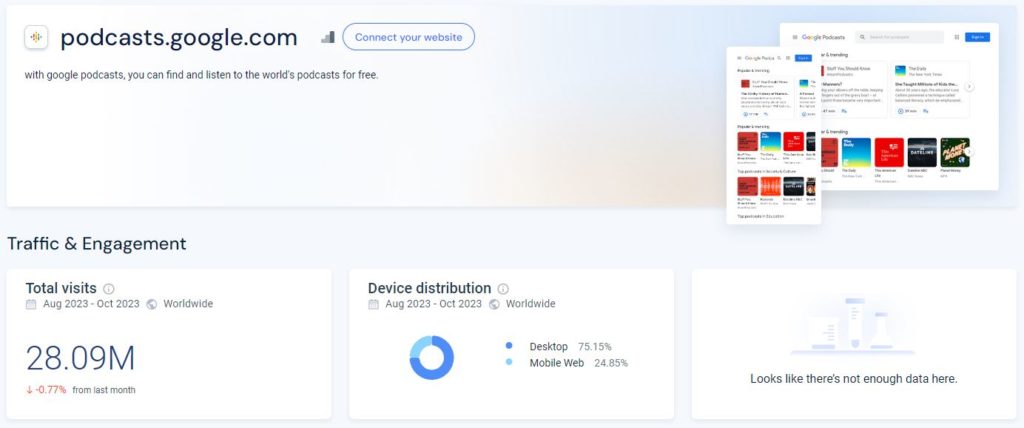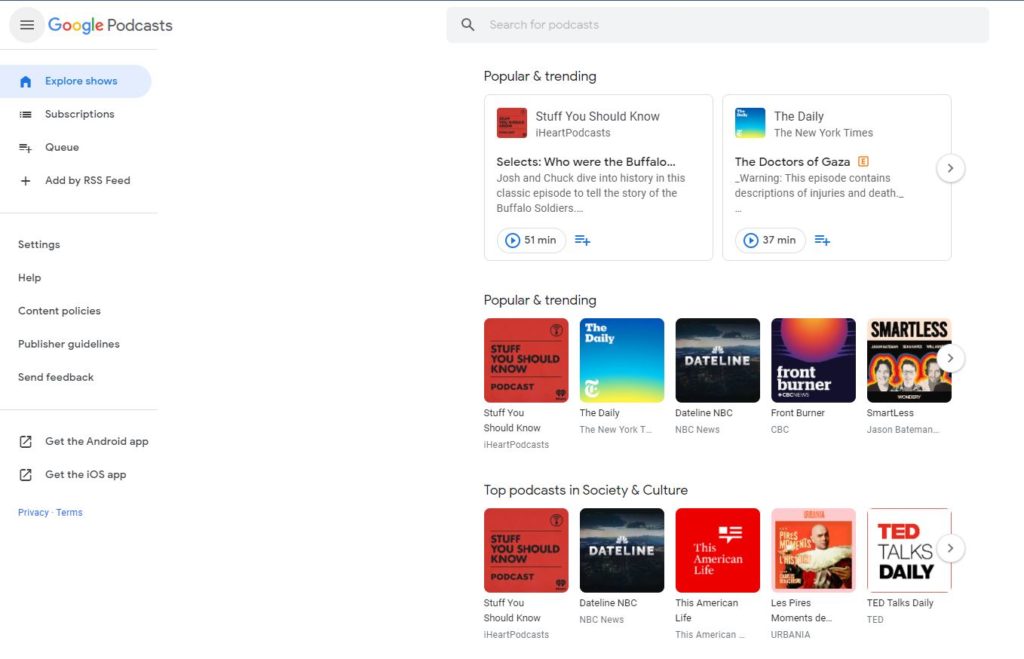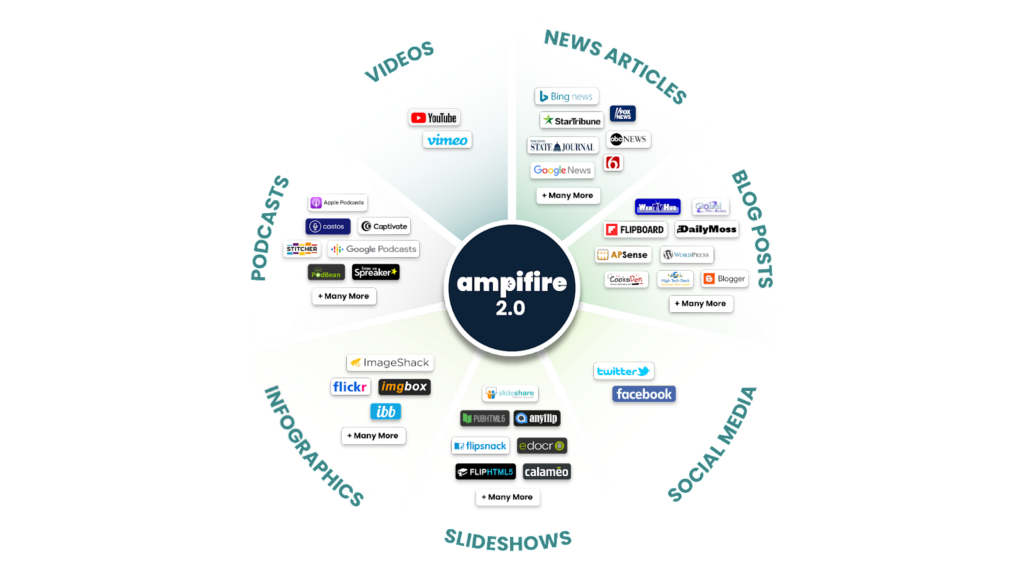
Is Google Podcasts Good for SEO?
Understanding the importance of SEO, or Search Engine Optimization, is crucial before diving into the potential benefits of Google Podcasts. In simple terms, SEO is the art of enhancing your website’s visibility when people search for products or services related to your business in Google and other search engines. The higher you appear in search results, the more likely you are to grab attention and attract prospective and existing customers to your business.
| Website: | Podcasts.Google.com |
| Founded: | 2018 |
| Type of Platform: | Podcast Directory |
| Key Features: | Manage Subscriptions, Auto-Downloads, Personalized Recommendations |
| Content Types: | Podcasts |
| Popular Content: | Podcasts on a wide variety of topics |
| Target Audience: | Podcast listeners of all ages |
| Domain Authority: | 92/100 |
Google Podcasts, launched in 2018, is a podcast platform developed by Google. It’s a space where creators distribute audio content, and listeners discover, subscribe to, and stream podcasts. Known for its user-friendly interface and seamless integration with Google’s ecosystem, Google Podcasts has quickly become a favorite among podcast enthusiasts. The platform caters to a diverse audience, offering content ranging from educational to entertainment podcasts.

One of the key features of Google Podcasts is its strong alignment with Google’s search capabilities. This alignment means that podcasts uploaded to Google Podcasts can directly influence search engine results. The platform’s domain authority is robust, as it’s part of Google’s comprehensive network. This high domain authority contributes positively to SEO efforts, as links from high-authority sites are a vital component of any SEO strategy.
Moreover, the type of popular content on Google Podcasts varies widely, reflecting the diverse interests of its global audience. This diversity offers opportunities for content creators and businesses to reach their target demographic more effectively. By aligning their content with the interests of their desired audience, creators can leverage Google Podcasts not just for direct listener engagement but also for enhancing their online visibility and SEO.
Are Google Podcasts Links Nofollow or Dofollow?
Let’s cut to the chase: Google Podcasts links a primarily nofollow. To grasp the significance of whether Google Podcasts links are nofollow or dofollow, it’s essential first to understand these terms. In the realm of SEO, “Dofollow” and “Nofollow” are two types of backlinks that can significantly impact your website’s search ranking. Dofollow links are like votes of confidence, signaling to search engines that the linked content is credible and valuable, which can boost your site’s visibility. On the other hand, nofollow links tell search engines to disregard the link in terms of passing on SEO value, although they can still generate traffic. While dofollow links hold more value, nofollow links also play an important role in the wider digital marketing landscape.

Now, addressing the main question: Are Google Podcasts backlinks nofollow or dofollow? The answer lies in Google’s typical approach to user-generated content. Generally, links from user-generated platforms tend to be nofollow to prevent spam and maintain the quality of search results. As a rule of thumb, Google Podcasts, like many other Google platforms, assigns a nofollow attribute to user-submitted links. This approach is part of Google’s efforts to ensure authentic and high-quality search engine results.
However, this doesn’t diminish the value of Google Podcasts for your SEO strategy. Even though the links are nofollow, they can drive traffic and increase your content’s visibility, which are crucial components of a successful SEO strategy. While nofollow links, like those from Google Podcasts, might not directly influence your search engine ranking, they are still valuable for driving traffic and enhancing your online presence.
How Do I Add a Backlink to Google Podcasts?
Before diving into the steps of adding a backlink to Google Podcasts, let’s quickly define what a backlink is. A backlink is essentially a link from one website to another. Think of it as a reference or a vote of confidence from one site to another, playing a pivotal role in SEO.
Now, let’s walk through how you can add a backlink to Google Podcasts:
The Steps to Add a Backlink
- Create Your Podcast Content: The first step is creating compelling podcast content that genuinely adds value to your audience. Your content should be engaging, informative, and relevant to your niche.
- Set Up a Google Podcasts Account: If you haven’t already, set up your account on Google Podcasts. You’ll need a Google account to do this.
- Upload Your Podcast: Once your account is ready, upload your podcast episodes to the platform. Make sure your podcast’s metadata (like the title, description, and tags) is accurate and SEO-friendly.
- Insert Your Website Link in the Podcast Description: Here’s where the backlink comes into play. In your podcast’s description, include a clear and direct link to your website. This is where you tell your listeners where they can find more information, essentially creating a backlink to your site.
- Optimize Your Podcast for Search Engines: Use relevant keywords in your podcast title and description to make it easier for your target audience to find your podcast when they search for topics related to your content.
- Promote Your Podcast: Share your podcast across your social media platforms, email newsletters, and other digital channels. This not only increases your podcast’s visibility but also the potential of your backlink driving traffic to your website.
- Regularly Update Your Content: Keep adding new and interesting episodes to your podcast channel. Regular updates not only keep your audience engaged but also maintain the relevance of your backlink.
- Engage with Your Audience: Encourage listeners to interact with your podcast through comments or social media. Engaging with your audience can lead to more shares and, in turn, more visibility for your backlink.
By following these steps, you can effectively add a backlink to Google Podcasts. Remember, the quality of your content is key. It’s not just about placing a link; it’s about providing value that encourages listeners to explore more on your website.
Best Practices for Posting on Google Podcasts
When posting on platforms like Google Podcasts, Overcast, or Pocket Casts, it’s crucial to follow certain best practices to ensure your content reaches and resonates with your target audience effectively. Here are some do’s and don’ts to keep in mind:
The Do’s and Don’ts of Posting to Google Podcasts
Do’s:
- Optimize Your Podcast Title and Description: Use relevant keywords that accurately describe your content. This not only helps with discoverability but also gives potential listeners a clear idea of what your podcast is about.
- Maintain Consistent Posting: Regular uploads can help build a loyal listener base. Consistency is key in keeping your audience engaged and looking forward to more content.
- Ensure High-Quality Audio: Good sound quality is essential. Invest in decent recording equipment and editing software to provide a pleasant listening experience.
- Engage with Your Listeners: Encourage listener interaction. Whether it’s asking for feedback or prompting discussions, engagement can greatly increase your podcast’s reach and popularity.
- Promote Your Podcast: Use your social media platforms, website, and other digital channels to promote your podcast episodes. Cross-promotion can significantly increase your audience size.
- Create a Show Homepage: Once you’ve established your podcast, creating a show homepage will allow listeners to find your show more easily.
- Link Your Homepage: Linking your show homepage with its RSS feed will allow for a more accessible way for listeners to access your show. You’ll also be able to add a “Listen on Google Podcasts” badge to your homepage!
Don’ts:
- Avoid Over-Promotion: While it’s important to promote your podcast, too much self-promotion within the podcast can be off-putting. Balance is key.
- Don’t Ignore SEO: Neglecting SEO practices in your podcast title, description, and tags can reduce your visibility on the platform.
- Refrain from Inconsistent Posting: Sporadic uploads can lead to a decrease in listener engagement and loyalty. Stick to a regular schedule.
- Don’t Neglect Feedback: Ignoring listener feedback can be detrimental. Constructive criticism is invaluable for improvement.
- Avoid Poor Audio Quality: Poor audio can turn listeners away, regardless of how good your content is. Investing in good audio equipment is crucial.
By following these guidelines, you can maximize the impact of your podcast on Google Podcasts. Remember, it’s about creating value for your listeners and using the platform effectively to reach your target audience.
Does AmpiFire Submit to Google Podcasts?
When it comes to leveraging platforms like Google Podcasts for content promotion and SEO, AmpiFire comes into the picture as a comprehensive content amplification tool. So, the burning question: Does AmpiFire submit to Google Podcasts? The straightforward answer is yes, AmpiFire can facilitate content distribution to platforms like Google Podcasts.

AmpiFire works by creating and distributing varied content forms, including articles, blog posts, slideshows, and, importantly for our discussion, podcasts. Here’s how it integrates with Google Podcasts:
- Content Optimization: AmpiFire’s system starts optimizing your unique content so it best aligns with your brand and message. This includes crafting podcast episodes that are informative, engaging, and optimized for both listeners and search engines.
- Strategic Distribution: Once the podcast is ready, AmpiFire strategically distributes it to various platforms, including Google Podcasts. This distribution is designed to maximize your content’s reach and impact.
- SEO Enhancement: By submitting to Google Podcasts, AmpiFire helps improve your content’s SEO. Given Google Podcasts’ integration with Google’s search engine, this can enhance online visibility and searchability.
- Audience Engagement: AmpiFire aims to not just distribute content but also engage the target audience. By placing your podcast on a popular platform like Google Podcasts, it increases the likelihood of reaching a wider, more diverse audience.
In essence, AmpiFire serves as a bridge between your content and platforms like Google Podcasts, streamlining the process of content distribution while enhancing its effectiveness in terms of reach and SEO impact. It’s a tool that not only focuses on the creation and distribution of content but also ensures that the content resonates with the intended audience and performs well in search engine rankings.
Get organic results with distribution done-for-you.
Discover AmpiFire and get your press releases be seen on Google News, YouTube, SlideShare, Apple Podcasts and many more…
Click Here To Learn More
Now that you’re armed with the knowledge about Google Podcasts and tools like AmpiFire, it’s time to take action. Are you ready to explore the vast potential of Google Podcasts and see how it can transform your SEO and content strategy? How about starting your first podcast episode today?
Frequently Asked Questions
Absolutely, Google Podcasts is a game-changer for SEO! It leverages Google’s search capabilities, significantly enhancing online visibility. While it’s not a magic bullet, it’s a potent tool in a broader SEO strategy, especially given its integration with Google’s powerful search engine.
Google Podcasts links are nofollow, but don’t let that deter you. They might not directly contribute to SEO in the traditional sense, but they’re fantastic for driving traffic and increasing visibility. Plus, the credibility and reach of Google’s platform can indirectly boost your SEO efforts.
The secret is quite straightforward – create engaging content and seamlessly incorporate your website link in your podcast description. This not only adds a backlink but also invites interested listeners to explore more on your site.
Yes, AmpiFire can certainly elevate your content’s reach on Google Podcasts. It excels in distributing and optimizing content for platforms like Google Podcasts, thereby enhancing your content’s visibility and engagement potential.
AmpiFire is impressive, but it’s not the only player in the game. Tools like BuzzSumo or Hootsuite also offer great features for content amplification. The edge AmpiFire has is its specific focus on diverse content types and strategic distribution, which is crucial for platforms like Google Podcasts.
Focus on high-quality, consistent content, optimized for SEO. Engage with your audience and use your other digital channels for promotion. The key is to balance informative content with strategic promotion.
